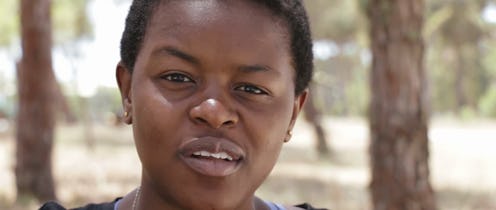Fashion
The Latest 'Pretty' Episodes Make A Big Statement

The website Un-Ruly "was created to celebrate and inspire the versatility and beauty of Black hair and women," according to its corresponding YouTube channel. On that YouTube channel, creator Antonia Opiah hosts her Pretty web series, a space dedicated to exploring what "pretty" means to women for color across different cities in Europe.
The Un-Ruly website offers advice, products, and personal anecdotes to empower black women and help them embrace their natural hair. But the Pretty series goes deeper still, delving into the issues that black women face daily, including (but not limited to) the stigma regarding their own beauty and the traditional Eurocentric beauty standards that often work against them.
One of the most important and interesting questions that gets asked of the women interviewed for every episode is, "When did you first become aware of your appearance?" Opiah tells me via email, "For many of the girls, being made aware of their race triggered becoming aware of their appearance and for others it was coming of age and becoming aware of boys."
This question leads not only to insight into how race ties into our perceptions of beauty, but it also opens up the debate about what the "requirements" are to be considered pretty in the first place.
With its latest set of episodes set in Tel Aviv, the series explores what "pretty" means in Israel. We're presented with ideas about just how different beauty standards can be, even across cultures in the same country. Interviewee Gloria, from episode 19, "Tel Aviv," moved to Israel from the Congo, fleeing persecution when she was only six years old. The move was ultimately a positive one, and although she said she was aware of the difference between her skin color and the whiteness of most people in Israel, she finds beauty in much deeper ways than simply appearance. Gloria sees her own smile and the honesty of that smile as being beautiful, as well as others' character and personality. "What really matters more than appearance [is] the character of the person."
Gloria's words are universal, and undoubtedly true. Although we may "judge a book by its cover" and although appearance is the first thing we often register about a person, we can find true beauty by getting to know individuals' personally. Being pretty and being beautiful might be two different things, but in my opinion, the latter is much more important.
Yityish Aynaw, of episode 20, Tel Aviv, went from being an Israeli army lieutenant to being crowned Israel's first black beauty queen. "Some people don't really accept that I have black skin and that I'm going to represent Israel," she says in episode 17 of the series, where she is also featured.
Aynaw acknowledges the success of her beauty pageant career as well as the struggle to always appear "elegant" when she just wants to dress "cool" the majority of the time. Although she is competition-winning beautiful, she's also undeniably smart and her actions speak louder than any definition of "pretty."
Aside from her triumph for black Israeli women in the beauty industry, she is also successful in arguably much more important ways. She collaborates with Netanya Foundation, a local community center for children, in the hopes that they can thrive regardless of social standing. She also revealed that she was too poor growing up to pursue her dream of dancing.
As well as this charity work, Aynaw is seen in the video campaigning with her community against police discrimination and violence. Just like Gloria commented in her own video, a person's beauty truly outshines their supposed prettiness when you get to know them, their character, and their actions.
By contrast, Carole, the interviewee of episode three of Pretty's Paris series, believes that "beauty is acceptance." Her video begins with her own answer to Opiah's question of when she become aware of her appearance. "I'd say it was when I was about 13/14 years old, in secondary school when I was a teenager," she said, "We became aware that our appearance could have a good or bad effect on others or yourself. And plus we were girls, starting to wear makeup, and attract boys."
As a western woman, I cannot help but feel that this is true for many of us. Some of us become aware of our appearance when it starts to get us the attention of the opposite sex, regardless of our own sexuality — which often isn't even figured out yet. That sometimes leads to modeling our appearances to either attract or avoid the male gaze. However, as the latest Israeli episodes of the Pretty series suggest, this isn't always the case for women who grow up with different societal and media pressures than those of us in the Western world. Watching the Pretty series, and especially these latest episodes, is a great way to become aware and conscious of those cultural, societal, and media pressures different to our own.
Still, as you track through all the episodes across Europe and Israel, there's an undeniable charm to each participant as you get to know of their lives and their stories. Each person's beauty shines through, regardless of their physical attractiveness by conventional standards.
If actions speak louder than words, they definitely speak louder than adhering to traditional beauty norms — no matter where you're located in this world. No matter how the interviewees in Israel define beauty as compared to some of the European subjects, each segment proves the subjectivity of this six-letter word.
Images: Courtesy Antonia Opiah/Un-Ruly